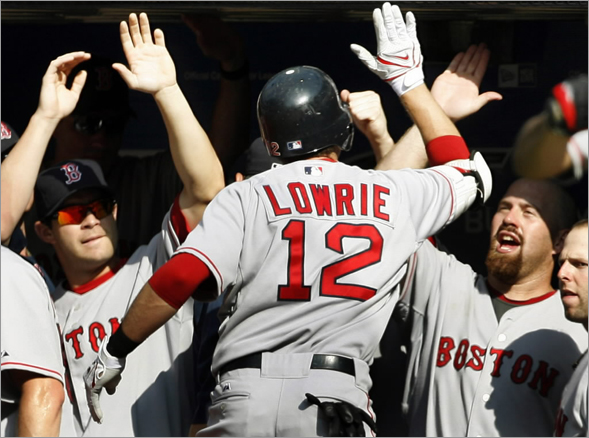 On October 6th, 2008, Jed Lowrie slipped the game winning hit through the right side of the infield, propelling the Red Sox past the Angels, and sending them to the American League Championship for a second straight year (two weeks later he would make the last out of the series, tapping a soft groundball to second). Shortly after the hit, my dad looked at me and said, “Well, looks like Lowrie has cemented himself in Red Sox lore forever now.”
On October 6th, 2008, Jed Lowrie slipped the game winning hit through the right side of the infield, propelling the Red Sox past the Angels, and sending them to the American League Championship for a second straight year (two weeks later he would make the last out of the series, tapping a soft groundball to second). Shortly after the hit, my dad looked at me and said, “Well, looks like Lowrie has cemented himself in Red Sox lore forever now.”
Last Wednesday, Lowrie was traded along with right-hander Kyle Weiland to the Houston Astros for reliever Mark Melancon. He is not cemented in Red Sox lore, now, or forever.
Here are the facts: He’s never played more than 88 games in a season, he’s never hit higher than .258 in a season, he’s never hit more than 9 home runs in a season, he’s had a negative FLD in more seasons than he’s had a positive ones, and he’s never been worth more than 1.9 WAR.
OK, so those stats are a little biased, there are some positives to the guy. He knows how to take a walk with a career 9.7 BB%. (To give you a comparison, Dustin Pedroia’s career mark is 9.4%). Not to mention he’s a switch hitting shortstop, something that certainly isn’t easy to come by. (Although this could be negated by the fact that his defensive ability at the position is less than spotty.) On top of that he has a little versatility, with the ability to play third and first base as well.
Some believe that if Lowrie were able to stay healthy for an entire season, he would be able to produce solid numbers. While this may be true, that’s a big if. Remember, this is a guy who’s barely been able to stay healthy for half a season, let alone a full 162 games. Yes, some of these have been strange ailments, like mononucleosis which is not something he can really control. But that was only one season, and all his other injuries seem to lead to one conclusion: he’s fragile.
On top of that, he’s replaceable. Jed Lowrie is a player who has never been worth more than two wins above a replacement level player (the average major leaguer is worth 2 wins). And that’s just what Boston did: they replaced him.
The backlash to Lowrie being traded is understandable. He’s been on the team for over three years, he’s a player that people have become familiar with. He showed incredible promise over that span in May this year, it looked like there was no ball that he couldn’t hit. But Lowrie has always been a streaky player, even worse he’s been a streaky player that can’t stay healthy. That’s a terrible combination.
Troy wrote a great piece yesterday about the advantages of Nick Punto, so I won’t repeat too much of what he said, but in essence Boston has replaced Lowrie with a player who, while he may not have as much potential with the bat, should stay healthy, and will likely contribute all, if not more, of what Lowrie would have. At the age of 28, there’s no better time to trade him, and that’s just what Cherrington did, cashed him in before his stock could fall any lower.
There’s no question that Boston’s bullpen depth was weak, so to be able to trade a utility man for a solid reliever (potentially even the team’s closer) seems to be a move that you don’t think twice about. Especially considering the fact that there was already a capable utility man on the team in the form of Mike Aviles, before the Sox even added Punto It may be hard to say now, but in a year, you won’t miss Jed Lowrie, no matter what he may be doing for the Houston Astros.
It seems like a long time ago that Jed Lowrie slapped that game winning hit for the Sox in the 2008 playoffs, and that’s because it was. In the scheme of things, three years may not be a long time, but in this game it can seem like an eternity. In the end, it’s really a lesson in how we value players. One base hit can seem like a career changing, or even life changing moment at the time, only to have it seem somewhat obsolete years later. How many people would be able to tell you that it was Jed Lowrie who notched the game winning hit in game 4 of the 2008 ALDS? My guess would be not that many. Maybe if Boston had gone on to win the World Series that year things would have been different, but they didn’t. And for Jed Lowrie, that’s just the way it goes.
When I first heard about the trade, my first reaction, as it usually is, was to tell my Dad. “Melancon?” he said, “He’s pretty decent, who’d we give up for him?”
I told him.
“Lowrie?” he said “He was never going to pan out anyway.”
